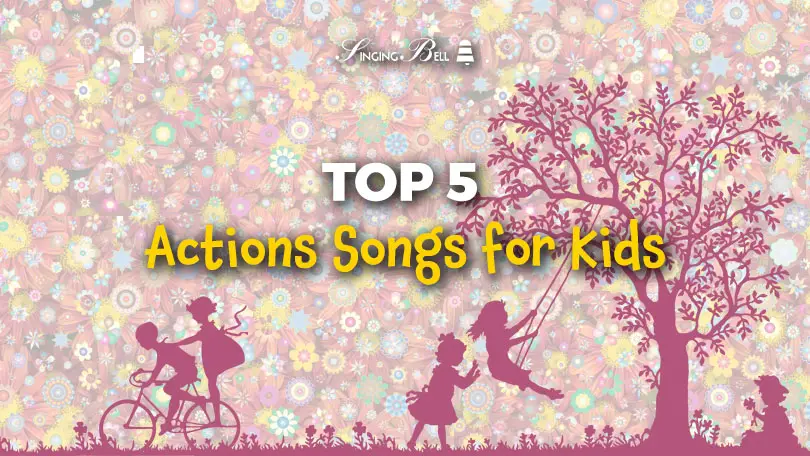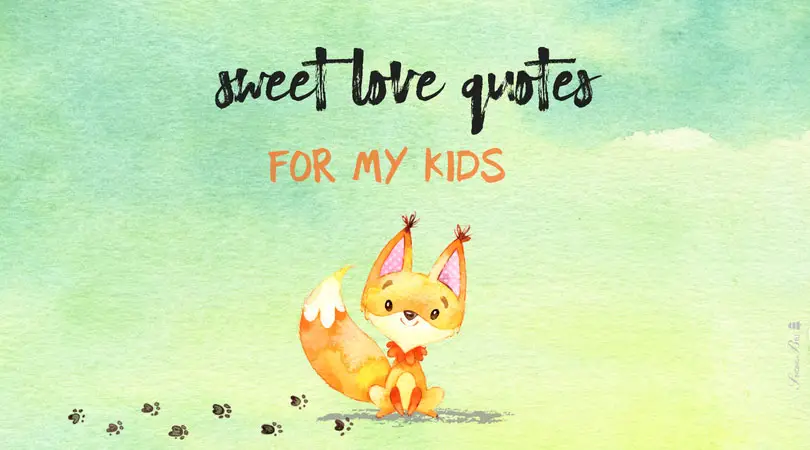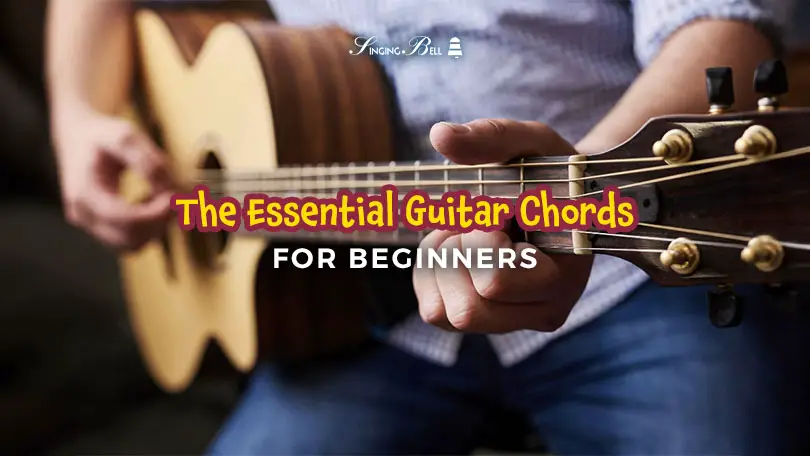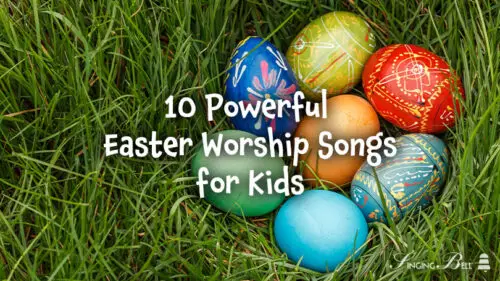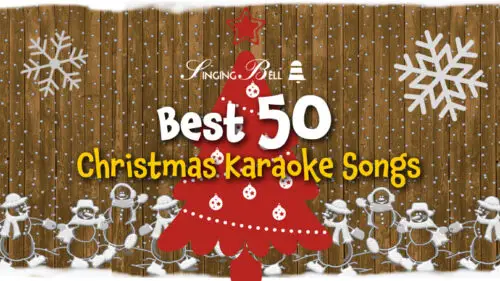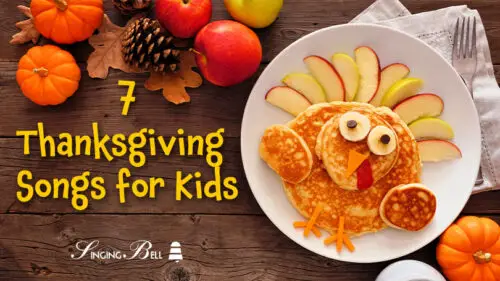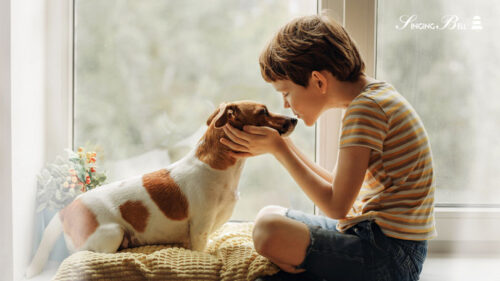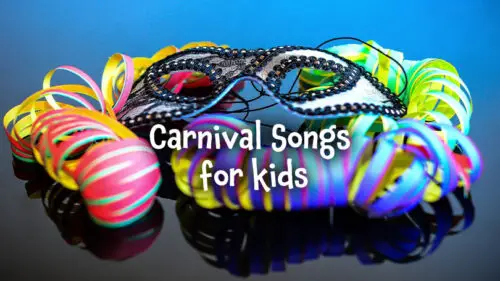
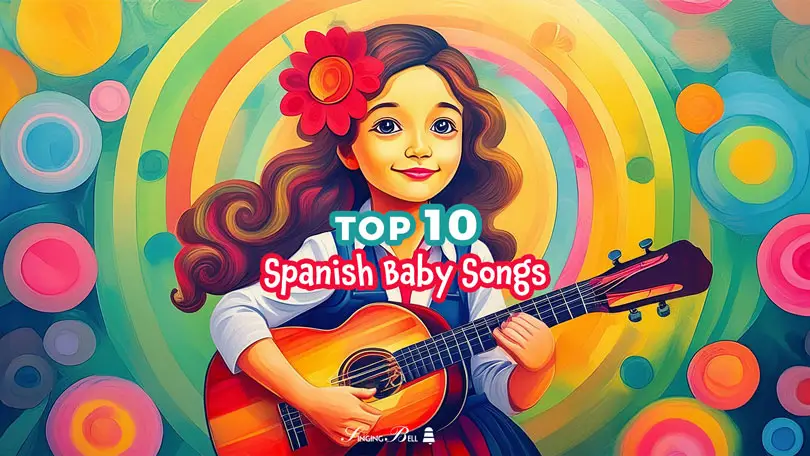
Introducing your baby to music is a wonderful way to stimulate their cognitive and emotional development. Spanish baby songs, with their rhythmic melodies and engaging lyrics, offer a delightful way to expose your little one to a new language and culture. These songs are not only entertaining but also educational, helping to build your baby’s listening skills, memory, and even early language skills.
In this post, we’ve compiled a list of 10 Spanish baby songs that are perfect for your bebé. These songs range from traditional nursery rhymes to playful tunes that have been passed down through generations. Each song is a beloved part of Spanish-speaking culture and is sure to bring joy and learning to your baby’s day.
Table of Contents
- Why Sing Spanish Baby Songs to Your Little One?
- 10 Selected Spanish Baby Songs
- Conclusion
- More blog posts you might like
Why Sing Spanish Baby Songs to Your Little One?
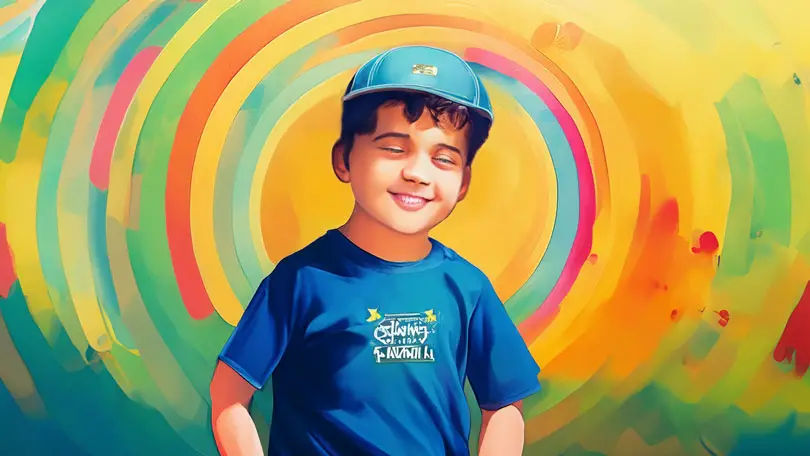
Singing Spanish baby songs to your little one has numerous benefits. Firstly, it introduces them to the sounds and rhythms of a new language, which can enhance their phonetic awareness and make it easier for them to learn multiple languages later in life.
Secondly, these songs often contain repetitive patterns and simple vocabulary that are ideal for language acquisition.
Moreover, music has been shown to have a positive impact on a child’s emotional well-being. Singing together creates a bonding experience between you and your baby, fostering a sense of security and love.
Additionally, the cultural richness embedded in these songs can provide your child with a broader understanding of the world around them.
10 Selected Spanish Baby Songs
1
Estrellita, ¿dónde estás?
“Estrellita, ¿dónde estás?” is the Spanish version of “Twinkle, Twinkle, Little Star.” Its gentle melody and soothing lyrics make it a perfect lullaby to help your baby relax and fall asleep. The song’s repetitive nature is also great for language development, helping your child become familiar with Spanish words and sounds.
1. Estrellita, ¿dónde estás?
me pregunto qué serás,
en el cielo y en el mar
un diamante de verdad.
Estrellita, ¿dónde estás?
me pregunto qué serás.
2. Cuando el sol se ha ido
ya cuando nada brilla más
tu nos nuestras tu brillar
brillas, brillas sin parar.
Estrellita, ¿dónde estás?
me pregunto qué serás.
3. Estrellita, ¿dónde estás?
me pregunto qué serás,
en el cielo y en el mar
un diamante de verdad.
Estrellita, ¿dónde estás?
me pregunto qué serás.
2
La vaca Lola
“La vaca Lola” (“The cow called Lola”) is a fun and catchy song about a cow named Lola. It’s a favorite among young children for its simple, memorable lyrics and upbeat tune. Singing this song helps babies learn animal names and sounds, making it an educational and enjoyable experience.
La vaca Lola, la vaca Lola,
Tiene cabeza y tiene cola,
La vaca Lola, la vaca Lola,
Tiene cabeza y tiene cola,
y hace “muu.”
3
Los pollitos dicen pio pio pio
“Los pollitos dicen pío pío pío” (“The chicks say twee twee twee”) is a classic Spanish nursery rhyme that tells the story of little chicks calling for their mother. This song is excellent for teaching your baby about animal sounds and familial relationships. Its repetitive and rhythmic structure aids in language learning and retention.
Los pollitos dicen
pío pío pío
cuando tienen hambre
cuando tienen frío.
La gallina busca
el maíz y el trigo
les da la comida
y les presta abrigo.
4
El patio de mi casa
“El patio de mi casa” is a traditional song often sung while playing games. Its lively melody and playful lyrics make it a great choice for engaging your baby in movement and dance. This song also introduces everyday vocabulary, helping your baby learn new words in a fun context.
El patio de mi casa es particular
Cuando llueve se moja como los demás
El patio de mi casa es particular
Cuando llueve se moja como los demás
Agáchate y vuélvete a agachar
Que los agachaditos sí saben jugar
H, I, J, K, L, M, N, A
Que si tú no me quieres otro amigo me querrá
H, I, J, K, L, M, N, O
Que si tú no me quieres otro amigo tendré yo
Chocolate
Molinillo
Corre, corre
Qué te pillo
Estirar, estirar que la reina va a pasar
El patio de mi casa es particular
Cuando llueve se moja como los demás
El patio de mi casa es particular
Cuando llueve se moja como los demás
Agáchate y vuélvete a agachar
Que los agachaditos sí saben jugar
H, I, J, K, L, M, N, A
Que si tú no me quieres otro amigo me querrá
H, I, J, K, L, M, N, O
Que si tú no me quieres otro amigo tendré yo
Chocolate
Molinillo
Corre, corre
Qué te pillo
Estirar, estirar que la reina va a pasar
5
Debajo de un / del botón
“Debajo de un botón” or “Debajo del botón” (“Under a/the button”) is a charming song about finding a tiny friend under a button. Its whimsical story and simple tune make it a delightful addition to your baby’s music repertoire. This song encourages imagination and curiosity in young listeners.
1. Bajo un botón, ton ton
que encontró Martín, tin tin
había un ratón, ton ton
ay que chiquitín, tin tin!
2. Ay que chiquitín, tin tin
era el ratón, ton ton
que encontró Martín, tin tin
bajo un botón, ton ton.
3. Es tan juguetón, ton, ton,
juguetón Martín, tin, tin
que metió el ratón, ton, ton,
en un calcetín, tin, tin.
4. En un calcetín, tin, tin,
vive aquel ratón, ton, ton,
lo metió Martín, tin, tin,
porque es juguetón, ton, ton.
6
A mi burro
“A mi burro” is a humorous song about a little donkey with various ailments. Each verse describes a different cure prescribed by the doctor, making it a fun way for children to learn about different body parts and actions. The repetitive structure of the song aids in memory and language acquisition.
1. A mi burro, a mi burro
le duele la cabeza
y el médico le ha dado
una gorrita gruesa
una gorrita gruesa
mi burro enfermo está
mi burro enfermo está
2. A mi burro, a mi burro
le duelen las orejas
y el médico le ha dado
un jarro de cerveza
un jarro de cerveza
una gorrita gruesa
mi burro enfermo está
mi burro enfermo está
3. A mi burro, a mi burro
le duele la garganta
y el médico le ha dado
una bufanda blanca
una bufanda blanca
un jarro de cerveza
una gorrita gruesa
mi burro enfermo está
mi burro enfermo está
4. A mi burro, a mi burro
le duele el corazón
y el médico le ha dado
gotitas de limón
gotitas de limón
una bufanda blanca
un jarro de cerveza
una gorrita gruesa
mi burro enfermo está
mi burro enfermo está
5. A mi burro, a mi burro
le duelen las rodillas
y el médico le ha dado
un frasco de pastillas
un frasco de pastillas
gotitas de limón
una bufanda blanca
un jarro de cerveza
una gorrita gruesa
mi burro enfermo está
mi burro enfermo está
6. A mi burro, a mi burro ya no le duele nada,
el médico le ha dado jarabe de manzana,
jarabe de manzana,
un frasco de pastillas
gotitas de limón
una bufanda blanca
un jarro de cerveza
una gorrita gruesa
mi burro sano está
mi burro sano está
mi burro sano está
mi burro sano está
7
Un elefante se balanceaba
“Un elefante se balanceaba” is a counting song that tells the tale of elephants balancing on a spider’s web. With each verse, another elephant joins in, making it a great way to introduce numbers and counting to your baby. The song’s repetitive nature helps reinforce these concepts.
1. Un elefante se balanceaba,
sobre la tela de una araña.
Como veía que resistía,
fue a llamar a otro elefante.
2. Dos elefantes se balanceaban,
Sobre la tela de una araña.
Como veían que resistía,
fueron a llamar a otro elefante.
3. Tres elefantes se balanceaban,
sobre la tela de una araña.
Como veían que resistía,
fueron a llamar a otro elefante
4. Cuatro…
8
La bamba
“La bamba” is a traditional Mexican folk song that has been adapted for children. Its lively rhythm and easy-to-sing chorus make it a hit with young listeners. Singing this song can introduce your baby to cultural heritage and the joy of music and dance.
Para bailar la bamba
Para bailar la bamba se necesita una poca de gracia
Una poca de gracia pa’ mi pa’ ti y arriba y arriba
Ah y arriba y arriba por ti seré, por ti seré, por ti seré
Yo no soy marinero
Yo no soy marinero, soy capitán,
Soy capitán, soy capitán
Bamba bamba
Para bailar la bamba
Para bailar la bamba se necesita una poca de gracia
Una poca de gracia pa’ mi pa’ ti ah y arriba y arriba
Para bailar la bamba
Para bailar la bamba se necesita una poca de gracia
Una poca de gracia pa’ mi pa’ ti ah y arriba y arriba
Ah y arriba y arriba por ti seré, por ti seré, por ti seré
Bamba bamba
9
Cinco lobitos
“Cinco lobitos” is a sweet fingerplay song about five little wolves. It is perfect for engaging your baby in interactive play while learning to count. The song’s gentle melody and repetitive lyrics make it easy for babies to follow along and enjoy.
Cinco lobitos tiene la loba,
cinco lobitos detrás de la escoba.
Cinco parió y cinco crio,
y a todos ellos la leche les dio.
10
El barquito chiquitito
“El barquito chiquitito” is a beloved song about a little boat on a long journey. Its narrative structure and catchy tune captivate young listeners, while the repetitive chorus helps with language learning. This song also introduces basic concepts of travel and adventure.
Había una vez un barco chiquitico
Había una vez un barco chiquitico
Había una vez un barco chiquitico
Que no podía, que no podía, que no podía navegar
Pasaron una, dos, tres, cuatro, cinco, seis, siete semanas
Pasaron una, dos, tres, cuatro, cinco, seis, siete semanas
Pasaron una, dos, tres, cuatro, cinco, seis, siete semanas
Y el barquito que no podía, que no podía navegar
Y si esta historia no les parece larga
Y si esta historia no les parece larga
Y si esta historia no les parece larga
La volveremos, la volveremos, la volveremos a empezar.
Había una vez un barco chiquitico
Había una vez un barco chiquitico
Había una vez un barco chiquitico
Que no podía, que no podía, que no podía navegar
Pasaron una, dos, tres, cuatro, cinco, seis, siete semanas
Pasaron una, dos, tres, cuatro, cinco, seis, siete semanas
Pasaron una, dos, tres, cuatro, cinco, seis, siete semanas
Y el barquito que no podía, que no podía navegar
Conclusion
Introducing your baby to Spanish baby songs is a wonderful way to enrich their early development with the beauty of music and language. These ten songs offer a delightful mix of soothing lullabies, playful tunes, and educational rhymes that are sure to engage and entertain your little one. By singing these songs, you not only create special bonding moments but also lay a strong foundation for your child’s linguistic and cognitive growth.
Liked it? Pin it!

Did you like this post? Rate it!
Keep reading! The article continues below these suggestions.
More blog posts you might like
You may also like:
Best 15 Spanish Songs for Kids Who Start Learning their First Spanish
10 Best Spanish Christmas Songs of the Entire Hispanic World



